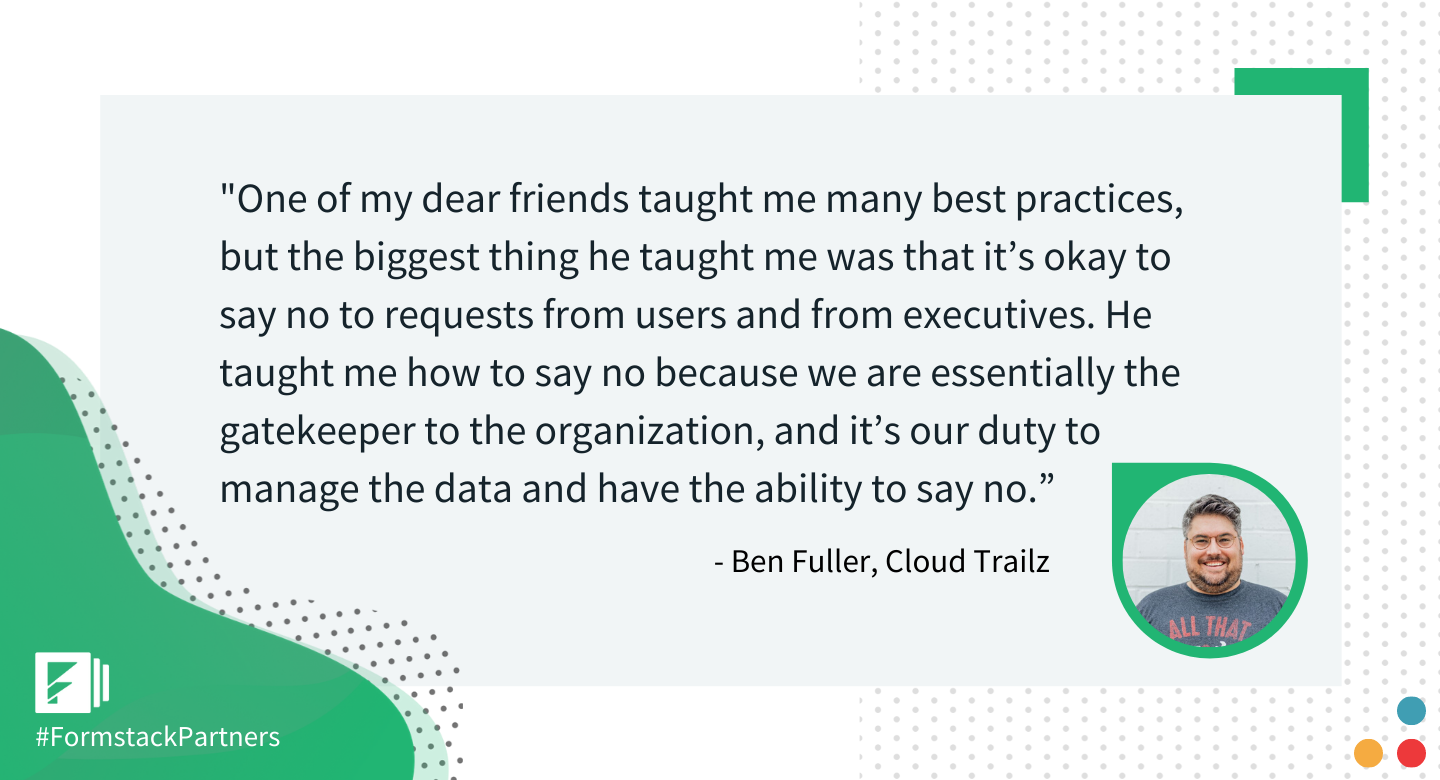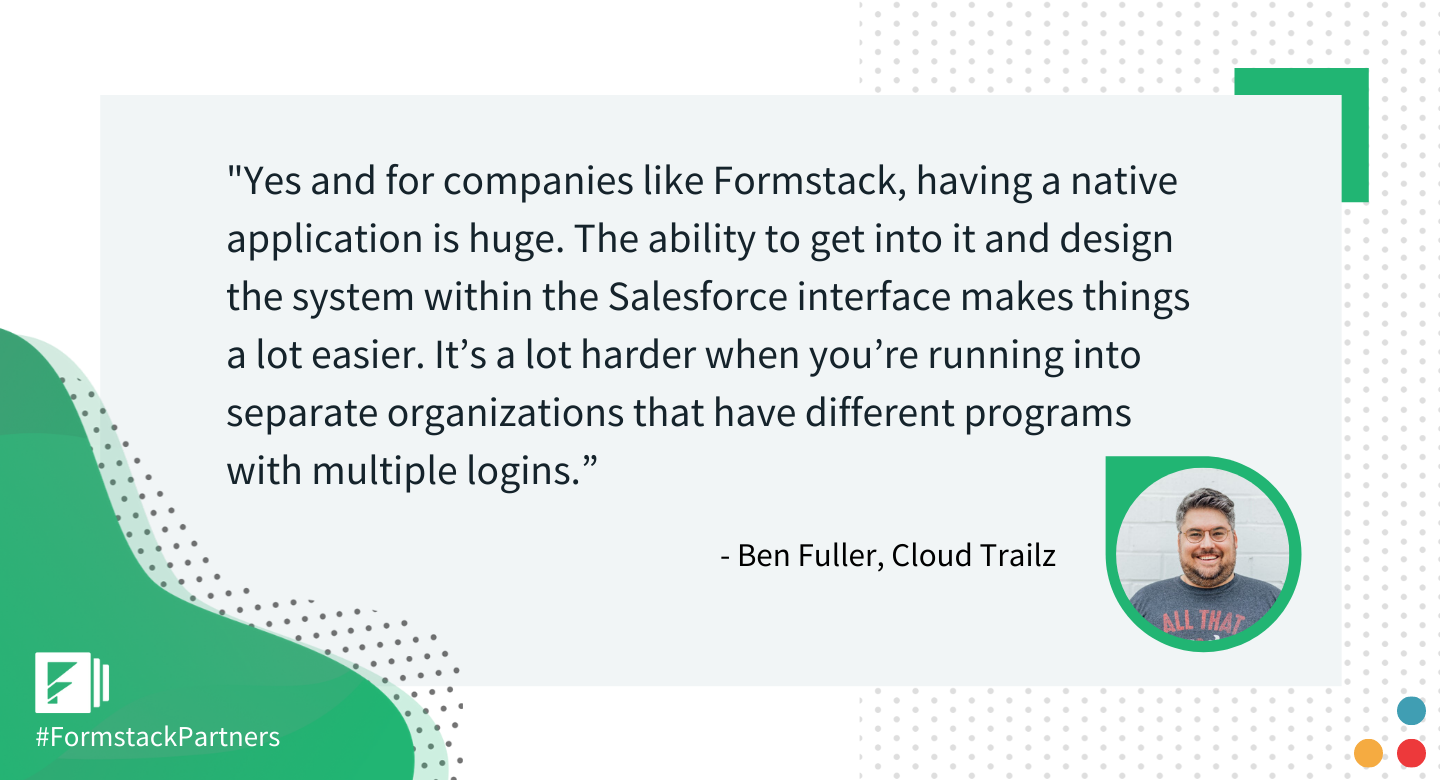Our VP of Partnerships Zak Pines recently sat down with Ben Fuller, Chief Revenue Officer of Cloud Trailz, as part of our ongoing Partner Interview Series. Zak and Ben had a far-ranging conversation that covered the Salesforce community landscape, the growth of revenue operations, and Ben’s career growth from throwing out the trash to Senior Admin. Here’s an abridged transcript of the chat.
Owning the Tech Stack
Zak: Cloud Trailz. I love the name. Lots of Salesforce roots there. Tell me more about it.
Ben: We are a team of Salesforce consultants based in Atlanta, Georgia, serving small business and mid-market customers. John Knight and I are the principals. We wanted to focus on helping small businesses—those people who are seeking simple, accessible services.
Our entire goal was to make our services available at a rate that meets their needs while also providing for them at the same time. We started off using an SMS system, where our clients could text technical questions to us, and we would answer. This was our best opportunity to help the community without causing people to pay more money when they just didn’t have the resources.
Zak: And you’re now also working full time at SaaSOptics. How’s it going?
Ben: It’s going well. The opportunity was brought to me through Mason Frank, one of the biggest Salesforce recruiters out there, and it was what I’ve been looking for—owning a tech stack as a Senior Admin. It’s performing revenue operations, with a focus on strategic systems. Anything involving Salesforce and our tech stack rolls up under my umbrella.
Zak: How did you get involved in Salesforce in the first place?
Ben: Right out of high school. My folks had a company that they built from the ground up, and that was my initial introduction to Salesforce in 2006. They made the migration to Salesforce and doubled the size of their company. All of a sudden it was much easier to do things.
I was fortunate enough that my parents are very into starting from the bottom, meaning when I started working for them, I was taking out the trash. I moved into technical support, working the support desk on specific Salesforce cases, and then into sales. Because I was using Salesforce so much, I became a power user. The company got acquired, and then I moved to Chicago to take a job at a startup, where I did my first implementation in Salesforce, front end to back end. It took off from there. My first real job as an admin was for a company called AAPC in Salt Lake City.
Zak: What are some of the things you remember learning in those early days?
Ben: One of my dear friends taught me many best practices, but the biggest thing he taught me was that it’s okay to say no to requests from users and from executives. He taught me how to say no because we are essentially the gatekeeper to the organization, and it’s our duty to manage the data and have the ability to say no.

Zak: If you don’t say no, you could end up with a complex mess on your hands.
Ben: Exactly. If you don’t say no, you’re just saying yes, and you’re allowing yourself to have an open door policy. That’s when you run into trouble. For me, I look at Salesforce as being brought in to implement best practices. If you veer away from that approach, things get more confusing, and then you end up having to build wonky workarounds.
Zak: You just made me think of a question that I really should be asking more as part of this series. What’s the silliest request or complaint you’ve ever gotten from a user?
Ben: I won’t name names, but I was working for a company who asked me to report for them and help figure out why their data wasn’t matching up. They were making updates in Excel, and they didn’t understand why Salesforce wasn’t showing them the data. I had to explain why Salesforce and Excel are not the same thing. It was a fun conversation.
Revenue Operations
Zak: You used the term revenue operations earlier. Can you define that from your perspective?
Ben: RevOps is a newer idea that has caught steam over the last few years. The general idea is taking the Operations Analyst role, which was traditionally more siloed, and pulling them from the sales, marketing, and finance organizations under one single team. This department owns the data instead of it living across different leadership, different departments, and different guidelines. Instead, they work together across all of the data within one single unified group.
Zak: I’ve always been a huge proponent of unified operations. Spend more time solving problems and setting the path for success instead of nitpicking numbers between siloes.
Ben: Exactly. So for example, revenue ops works hand in hand with sales and marketing to determine how we define an MQL versus an SQL. It becomes easier to make those calls and build reports that generate the data when we all agree to one approach. It’s what drives a company forward instead of having sales ops or marketing ops decide separately on how they want to report.
Zak: Do you like the term unified operations?
Ben: Yes. I think when it comes to the funnel, this approach does really well. Now the Chief Revenue Officer role, for example, is really growing out of this RevOps movement where there are live, regular operations directly within the CRM, where all of this data lives. This also ensures that money is being spent in the right places.
Salesforce Community Building & Engagement
Zak: You seem to be a natural community builder in the Salesforce world. Would you agree?
Ben: I try to be. We try to do a lot in the community here in Atlanta. We have a monthly luncheon, a RevOps lunch, where a bunch of consulting firms get together, have lunch, and talk best practices. We annoy every restaurant because there are 30 of us, and each of us pays our check individually.
Zak: What other Salesforce communities are you part of?
Ben: There's Ohana, which is very large and built up of Salesforce admins. It’s loosely tied to the trail and closely tied to Salesforce. There’s Salesforce Saturdays started by Michelle Bura three or four years ago. They regularly get 50 to 60 attendees on Saturday mornings. It’s been growing so much that we need to find new places to hold it. We’ve been building up multiple events a month in different geographical areas so more people can attend.
Then there’s some good virtual sessions. Every Tuesday night, there are free study sessions that are hosted remotely via Zoom. Each session has a presenter who teaches something new about the admin certification. The goal is to help people get certified. On Wednesdays there’s a developer session. There are plenty of options.
Zak: It sounds like these communities are both great networking and learning resources for you.
Ben: Yes, I encourage everybody to get out to their community groups and join. These user groups are awesome to get to know other admins in the world—not to mention the information that’s available to us. If I have an issue with Salesforce, someone else has already experienced the issue and solved for it. I’m not creating and discovering new issues within the Salesforce platform. The answer is already out there somewhere, and you’re not going to find the answer unless you get engaged and involved in the community.
Zak: Is it fair to say your career is now within the Salesforce community?
Ben: Yes, I would say I’ve been solidly in the Salesforce community now for six or seven years.
Formstack for Salesforce
Zak: Your point earlier about not allowing your CRM implementation to get too complex resonated with me. That also ties to using standardized Salesforce products instead of creating custom coded approaches, right?
Ben: Exactly. Declarative work versus custom development. The big push for Salesforce is clicks not code. Drag and drop, simplicity, ease of use.
Zak: This topic is interesting because it has a direct tie into Formstack’s Salesforce app as a native form builder. You can either do a custom build, or you could use the AppExchange product to customize your various forms and data collection interactions. A productized approach empowers you as a consultant and your customers to be able to more easily make changes and evolve over time.
Ben: Yes and for companies like Formstack, having a native application is huge. The ability to get into it and design the system within the Salesforce interface makes things a lot easier. It’s a lot harder when you’re running into separate organizations that have different programs with multiple logins—not to mention another set of trainings to learn how each system works. This is especially challenging for an admin who is probably already overworked and doesn’t have the resources or support.

Zak: Feedback we often get from admins is greatly appreciating that you don’t have to go anywhere or map any data or work with an API. You are working directly with your Salesforce data and objects.
Ben: That’s huge, and I’m also excited to dig in more to how you are bringing together forms, document automation, and eSignature in Salesforce. That is a powerful combination.
Lightning Round
Zak: Let’s end with our lighting round. What are some of your personal hobbies or interests?
Ben: I used to see a lot of movies, but it’s kind of slowed down again since we had our first little girl back in June. I made her a hashtag on LinkedIn because that’s what I do. #BabyFuller. She’s the littlest admin, and we actually have some Salesforce onesies she’ll eventually grow into.
Zak: I was going to ask what your favorite TV show is, but since you’re a movie buff, what’s your favorite movie?
Ben: I’ve seen every “Fast and Furious” movie except the last one on opening night. I know they’re garbage, but I love them—whether you watch them backward, forward, it doesn’t matter. I will defend those movies to the end.
Zak: Do you have a productivity tip you can share?
Ben: For me, a big part of this role is managing incoming user requests. I read a great post about using cases within Salesforce. I use cases to manage the requests for my team; I can assign roles and prioritize as needed. Then we have reporting dashboards so we can track which departments submit requests, and if there’s a pattern, we can determine if there’s some retraining that needs to be done.
Zak: What’s your go-to lunch during the workday?
Ben: Man, I just killed 15 chicken wings. I can eat wings. I mean, I can eat them three to four times a week if my wife lets me. If I can get wings, I’m happy.
Zak: You’re well qualified then to weigh in on this debate we’re having within Formstack. A big one. Is a hot dog a sandwich?
Ben: No, that’s weird.
Looking for your next step? Check out Formstack’s partner program for consultants, agencies, and tech partners.











